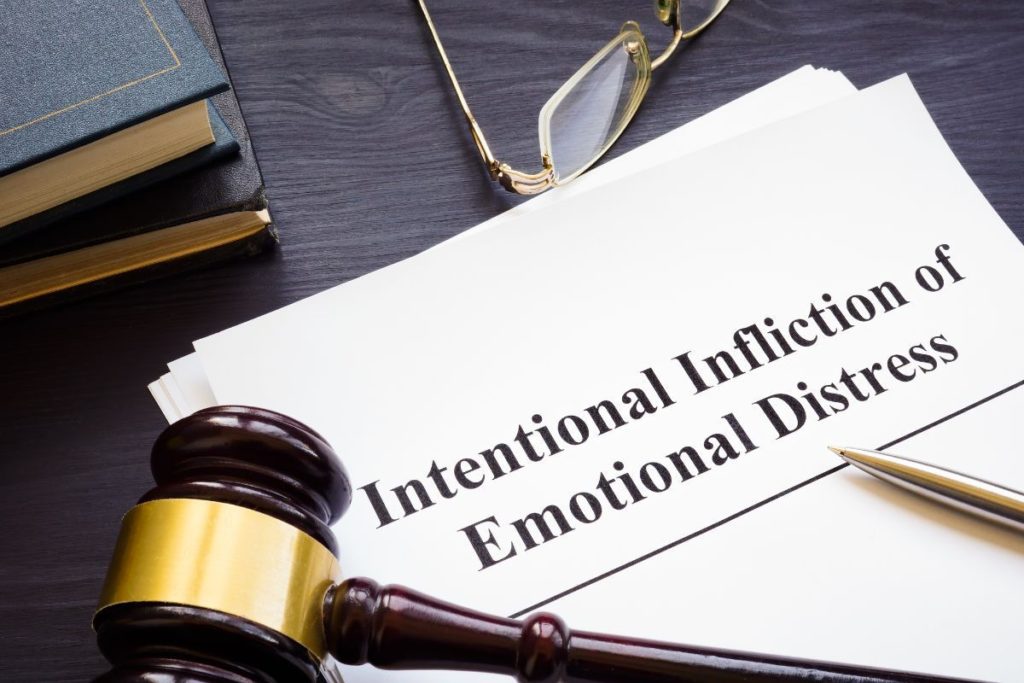If you have suffered emotional harm due to another person’s negligence, you may have a claim for intentional infliction of emotional distress. After sustaining this type of injury, it’s important to understand the other party’s potential liability and your rights. The first step is to find out more about your injury. So, what is intentional infliction of emotional distress?
What is Intentional Infliction of Emotional Distress?
Intentional infliction of emotional distress is a tort liability claim involving someone causing another person extreme emotional harm through reckless or negligent conduct.
The elements of this claim will vary by state, but generally, the following factors are required to establish an intentional infliction of emotional distress claim:
- Intentional or reckless behavior
- Extreme or outrageous conduct
- Causing injury-emotional distress
- Resulting in severe distress
When establishing this claim, the injured party will have the burden of proving that they were significantly emotionally impacted and that the responsible party acted intentionally in an outrageous and extreme manner.
What is “Extreme and Outrageous” Conduct?
Determining what meets the definition of extreme or outrageous conduct can be complicated. Generally, this would include behavior that goes so far outside of the bounds of ordinary conduct as to be shocking. In deciding whether something meets that definition, the court can consider past decisions, the facts of the case, and any extraordinary circumstances.
Damages and an Intentional Infliction of Emotional Distress Claim
Intentional infliction of emotional distress damages can range by case and according to the laws of the applicable jurisdiction. In some cases, there will be statutory limits on the amount an injured party can recover for their emotional harm. In others, courts will also determine the damages by precedents established in past cases.
Generally, intentional infliction of emotional distress claims will include the party’s actual expenses and the costs associated with their pain and suffering. However, unlike a physical injury which can be proven with medical tests and bills, emotional injuries can vary significantly from person to person. Therefore, quantifying these expenses can sometimes prove to be difficult.
It’s generally not necessary for a plaintiff to have physical injuries from their emotional distress. However, if the injured party was physically harmed, that fact will most likely be considered when assessing damages.
If the actions of another have emotionally harmed you or a loved one, you should contact an experienced personal injury attorney as soon as possible to review your case. Your lawyer can help you evaluate your emotional damages and determine the most effective ways to prove your claim.
The “Impact Rule”
In some states, there is something called the “impact rule,” which is used to assess how the culpable party’s actions affected the injured person. Under this rule, an injured party would not be able to recover damages if they did not suffer an injury. However, in many jurisdictions, the rule has been modified to allow for recovery for emotional trauma regardless of physical injury.
Bystander Rule
There may also be a basis to recover for infliction of emotional distress when a party witnesses the injury or death of a loved one. Under the “bystander rule,” someone close to the injured party who witnessed an event such as the death of a loved one due to intentional or negligent conduct may also have a cause of action for intentional infliction of emotional distress. Typically, the person hurt or killed must be a parent, spouse, child, sibling, grandparent, or grandchild for the injured bystander to have a claim.
Contact an Experienced Personal Injury Attorney
Establishing the elements of an intentional infliction of emotional distress claim can be complicated. If you or a loved one have been emotionally harmed by another party’s willful or reckless conduct, you should contact an experienced personal injury attorney as soon as possible to review your case.
At The Daily Firm, P.C., we are experienced personal injury attorneys who understand how intentional infliction of emotional distress cases work. We can help you evaluate your case and determine your available damages. Our dedicated attorneys are ready to fight for you!

